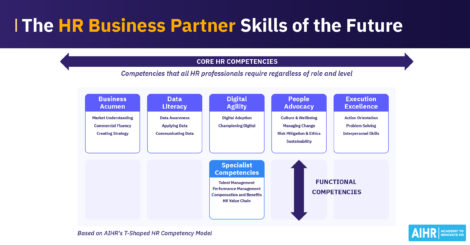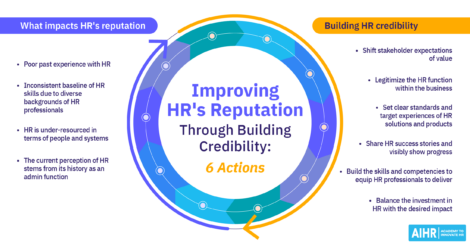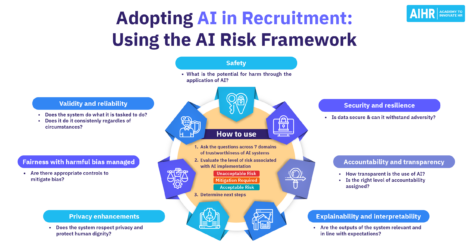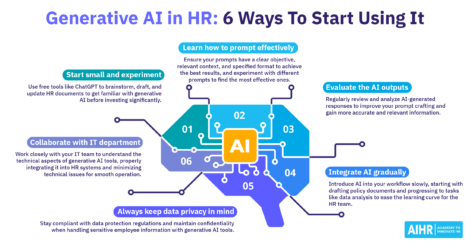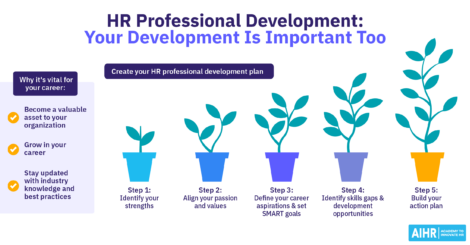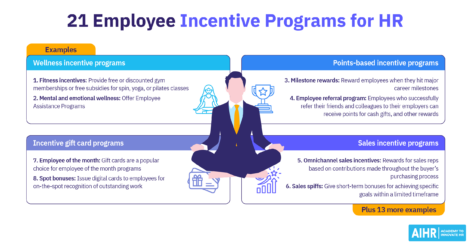How To Build the HR-Board Relationship for Organizational Success
“To win the marketplace, you must first win the workplace,” says Doug Conant, business leader and author. If organizations want to “win the workplace”, the HR agenda should be a key focus at the highest level of the business—the board.

The visibility and importance of HR at the board level have been steadily increasing due to enhanced governance oversight and the growing recognition of HR as a strategic contributor to future-proofing businesses in terms of talent and culture.
For many CHROs, managing the HR-board relationships is a relatively new experience, and many report feeling unprepared to meet the expectations set by the board and other executive team members. A further 39% also stated they wish they were more prepared to deal with the board in hindsight.
In this article, we explore the HR-board relationship, focusing on the CHRO’s responsibilities and the skills required for success.
Contents
The role of HR within the board of directors
The challenges that the CHRO faces at the board level
Getting HR-board relationships right: 5 steps
Getting started with the right skills
The role of HR within the board of directors
Externally, shifts in the labor market, economic pressures, and political and social influences have expanded the board’s roles and responsibilities in guiding organizations toward the future.
Increasing governance oversight regarding executive pay and diversity, increasing demands for transparency, more pressure on performance, and more interest from board members related to executive succession, culture, and wellbeing have demanded more from CHROs regarding their interactions with the board. They primarily engage with the Social and Ethics Committee and the Remuneration Committee, often participating as invitees to address specific questions or topics.
Given the increasing importance of HR, the CHRO’s presence as a regular board member has also been rising. According to the Stuart Spencer Board Index, 93% of the 200 surveyed CHROs regularly attend their company board meetings, with 81% actively involved in driving CEO succession. Additionally, a survey of people leaders revealed that 43% reported an increase in their interactions with the board over the last 12 months.
While representation has improved, clarity regarding the CHRO’s role at the Board level still needs to be improved. Many still perceive the CHRO as a manager of people risks, viewing the position chiefly as focused on legislative and compliance matters, ensuring fair and just labor practices. Similarly, some CHROs are uncertain about how to engage with the board and which topics to present for discussion.
In our view, the CHRO at the board level is the owner of four distinct agendas:
People strategy and risk agenda
The CHRO champions the people strategy at the board level. This involves helping the board understand the desired employer brand, the business’s market positioning regarding talent and skills, and the primary risks that must be managed to ensure a productive and impactful work environment.
These risks may encompass factors such as the shift towards AI-empowered work, navigating the complexities of remote working, and formulating responses to political unrest that impacts employees.
Talent, skills, and sustainability agenda
The CHRO serves as the custodian of the talent and skills agenda at the board level. Their role is to keep the board informed about approaches to talent sustainability and the attraction, development, and retention of critical skills.
Additionally, the CHRO must assure the board that the organization is actively managing skills gaps and has plans for the succession of critical skills and leadership. This responsibility often extends to involvement in CEO succession and the recruitment of future board members.
Beyond talent and skills, there is a growing emphasis on environmental, social, and governance (ESG) matters. CHROs are becoming key in shaping a culture of sustainability and fostering responsible organizational citizenship within the communities they serve.
Culture, engagement, and productivity agenda
The CHRO clarifies for the board the desired organizational culture, employee engagement, and how current workplace practices contribute to sustained productivity and performance over time.
In this role, the CHRO goes beyond merely reporting on employee engagement surveys and net promoter scores. Instead, the focus is on showing the board how specific HR initiatives drive the desired levels of engagement and culture necessary for success today and in the future.
Workforce diversity agenda
The CHRO promotes the workforce diversity agenda, ensuring the board recognizes that the organization is accessible, representative, and inclusive of talent at all levels.
In this capacity, the CHRO helps the board understand the workforce beyond demographic data, enabling informed decisions related to key workforce drivers such as compensation and benefits, ethics, and policy.
Even though CHROs are welcomed into the boardroom, they still face challenges regarding their legitimacy, misunderstandings of the value of HR, and dynamics between the executive team members who already serve on the board.
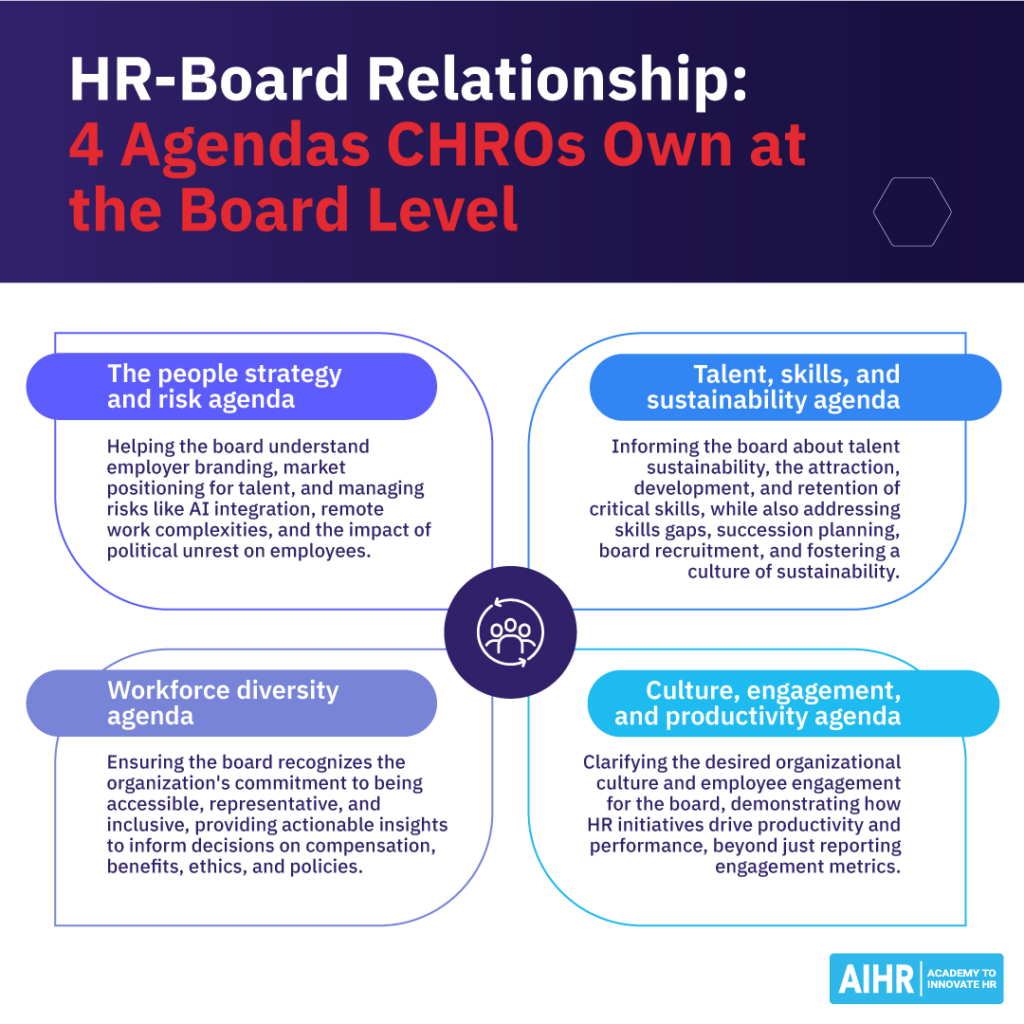
The challenges that the CHRO faces at the board level
Research by the global executive search and leadership consulting firm Spencer Stuart indicates that more than 27% of board members come from a financial background. They prefer that boards recruit previous CEO, COO, or CFO individuals as board members.
The board’s composition significantly influences its knowledge and understanding of the HR agenda. A board inexperienced in HR matters may not fully grasp the CHRO’s value, leading to exclusion from critical conversations, derailment when contributing to the four agendas mentioned above, or dismissal of the CHRO’s suggestions.
Conversely, when boards welcome the CHRO and appreciate the topics presented, other executive dynamics often come into play. Some CEOs may view the CHRO as a threat to their credibility, particularly in environments with leadership and culture challenges.
Similarly, the CFO might perceive the CHRO’s efforts to secure investment for people initiatives as leveraging board influence for personal gain or see the discussion on people topics as a distraction and waste of valuable board time.
These scenarios, while extreme, occur more frequently than expected, and HR leaders need to manage these challenges to successfully represent HR at the board level.
Getting the HR-board relationship right: 5 steps
How can the CHRO ensure healthy board relationships while effectively representing the four agendas highlighted above?
1. Setting mutual expectations
First, CHROs must establish clear agreements with the board that align with the four agendas. This involves defining the CHRO’s role at the board level and agreeing on the frequency, cadence, and specific topics requiring more oversight.
CHROs should also use this opportunity to set their expectations for the board, including the type of input they seek from board members.
2. Actively investing in board relationships
Second, the CHRO should actively cultivate relationships with board members outside the boardroom, particularly with the chairpersons of committees related to the HR agenda.
While respecting boundaries, the CHRO must ensure open and transparent communication channels to test specific ideas and manage board expectations outside formal meetings.
We discussed building HR-board relationships with Emmanuel Michael, leadership and career success coach, author, and public speaker. See the full conversation below:
3. Simplifying upwards
As mentioned earlier, many board members lack an HR background. Therefore, the CHRO must simplify, translate, and relate HR information to demonstrate its relevance and value to the board.
Many CHROs view the board as merely another reporting forum for updates and progress discussions. While this is sometimes necessary, it is more important to provide context straightforwardly, enabling the board to connect HR priorities with business requirements.
A highly effective approach for this purpose is to incorporate storytelling and share information using a consistent HR board report format. This creates familiarity and helps board members engage more with the HR narrative.
4. Balancing listening with telling
A common mistake many CHROs make is approaching the board solely to inform them about HR activities rather than also seeking feedback and input.
A strong board offers diverse and often underrepresented perspectives, so the CHRO must balance “telling” with “listening” to maximize the limited time spent with the board. This allows for a productive exchange and effectively leverages the board’s insights.
5. Presenting a united front with the C-suite
Lastly, the CHRO must ensure alignment with the rest of the C-suite on critical matters presented to the board.
This doesn’t mean the CHRO should always agree without question; however, if a debate is likely, the CHRO should communicate their perspective to other executive team members before the board meeting. It’s a delicate balance, but the CHRO should strive to align with other business leaders on crucial topics and perspectives whenever possible.
This approach fosters mutual trust and support within the C-suite during board discussions.
Getting started with the right skills
Transitioning into a board-level role can be a daunting task for many CHROs. However, there are specific skills that can help them actively prepare for this next step. AIHR’s T-Shaped HR Competency Model shows the core competencies all HR professionals need:
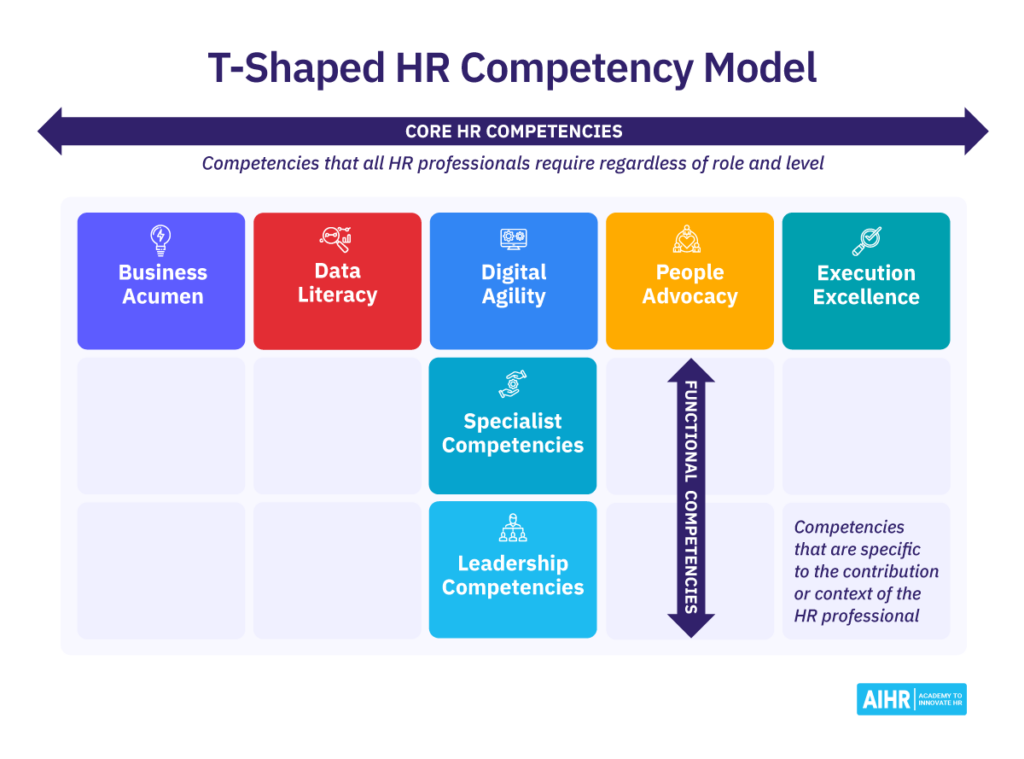
Based on the model, CHROs must work on the following skills to succeed at the board level:
- Improving business acumen: Extend your knowledge beyond the organizational context to include insights into macro-market dynamics, megatrends, and industry developments. Stay informed about external events, build relationships with industry partners or bodies, and cultivate a diverse network of professionals to gain valuable insights.
- Active listening and storytelling: Develop the ability to actively listen, interpret information, and use data to tell compelling stories that drive business decisions. Storytelling is not just about visualizing information; it involves connecting the board cognitively and emotionally to what is being presented, ensuring balanced decision-making.
- Managing complexity: This level requires navigating the complexities, including balancing multiple and often conflicting priorities and handling the sheer volume of information that needs to be processed. CHROs can develop this skill by adopting specific frameworks for better analysis and organization, leveraging technology to access information in a manageable format, and increasing their ability to view arguments from various perspectives while recognizing their biases.
- People advocacy: CHROs must be able to manage the balance between building cultures of wellbeing that are also productive and drive performance. They need to develop this skill to represent the people’s voice while also responsibly balancing business priorities.
Final words
Building strong HR-board relationships is essential for CHROs to effectively influence key areas such as governance, executive pay, diversity, and succession planning. What’s more, successfully navigating board interactions can establish the legitimacy and credibility necessary to drive the strategic HR agenda.
Weekly update
Stay up-to-date with the latest news, trends, and resources in HR
Learn more
Related articles
Are you ready for the future of HR?
Learn modern and relevant HR skills, online






